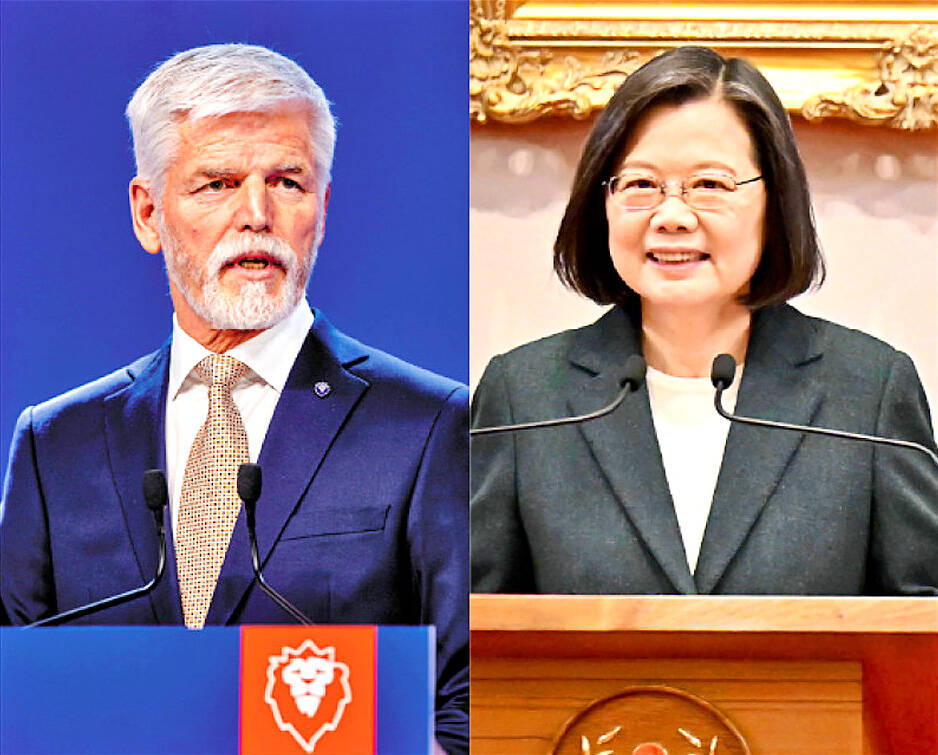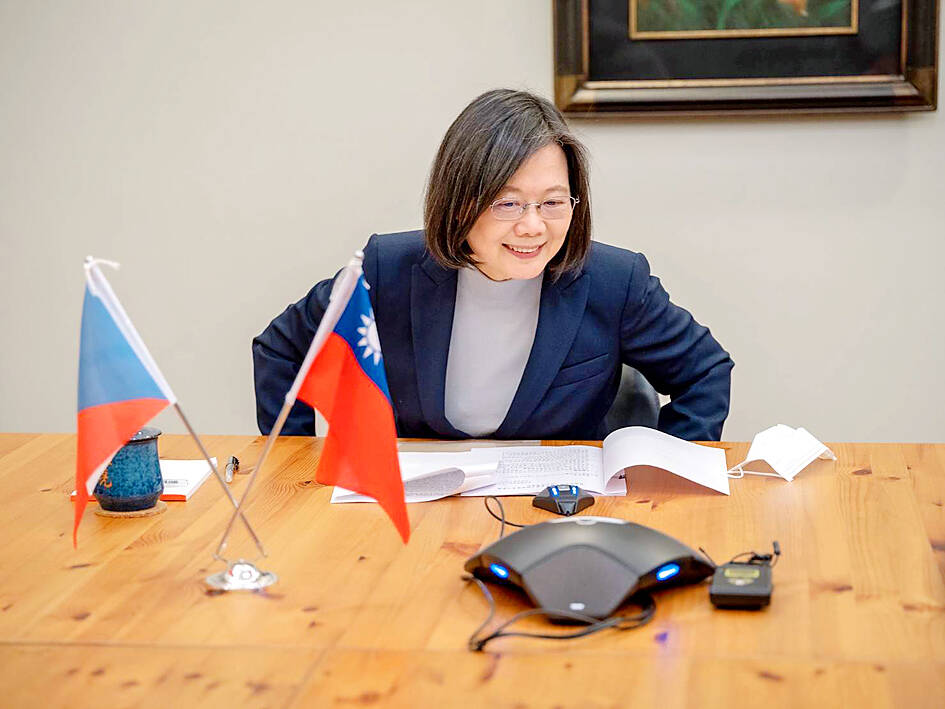Czech president-elect Petr Pavel spoke by telephone with President Tsai Ing-wen (蔡英文) yesterday, a highly unusual move given the lack of formal ties and a diplomatic coup for Taipei.
Tsai spoke with Pavel for 15 minutes in a harmonious atmosphere, Presidential Office spokeswoman Lin Yu-chan (林聿禪) said, adding that Minister of Foreign Affairs Joseph Wu (吳釗燮) was also present during the conversation.
Lin quoted Pavel as telling Tsai that Taiwan is a trustworthy partner, adding that the Czech Republic stands firmly on the side of democracy and supports Taiwan in maintaining a lively democratic system free from authoritarian coercion.

Photo: EPA and Taipei Times
The Czech Republic would boost cooperation with Taiwan in all aspects, he added.
Most nations’ leaders avoid high-level public interactions with Taiwan and its president, not wishing to provoke China, the world’s second-largest economy.
Then-US president-elect Donald Trump in 2016 spoke by telephone with Tsai shortly after winning the election, setting off a storm of protest from Beijing.

Photo courtesy of the Presidential Office
Pavel, a retired general who served as the head of NATO’s military committee from 2015 to 2018, beat populist billionaire Andrej Babis in a presidential runoff.
He is due to take the oath of office on March 9 and replace Czech President Milos Zeman, who promoted friendly ties with China and Russia until Moscow invaded Ukraine in February last year.
Analysts said that Pavel’s approach would be very different from Zeman’s with a strong pro-Western drive focusing on ties with the EU and NATO.
Pavel, a staunch supporter of war-torn Ukraine and of its bid to join the EU, talked to Ukrainian President Volodymyr Zelenskiy by telephone on Sunday.
In an interview with the Czech Radio, Pavel said he would support his nation’s links with Taiwan, a major investor in the Czech Republic.
Prague officially pursues a “one China” policy, like the EU, but Czech officials foster close ties with Taiwan.
Pavel said the “one China” policy should be supplemented with a “two system” principle.
“There is nothing wrong if we have specific relations with Taiwan, which is the other system,” Pavel said. “It is definitely in our interest to retain active business and maybe also scientific relations with Taiwan.”
The Presidential Office on Sunday said that Tsai had offered her congratulations to Pavel on his victory.
Asked about Tsai reportedly having the call with Pavel, Chinese Nationalist Party (KMT) Chairman Eric Chu (朱立倫) yesterday said that all dialogues and friendships with democratic nations or other countries are welcome.
Taipei has sought to bolster its relations with European nations by stressing the shared values of freedom and democracy, especially as Beijing ratchets up its threats.
Czech Senate President Milos Vystrcil visited Taiwan in 2020 and declared himself to be Taiwanese in a speech at the legislature in Taipei, channeling late US president John F. Kennedy’s defiance of communism in Berlin in 1963.
Additional reporting by Chen Yun and Lin Liang-sheng

The Central Election Commission has amended election and recall regulations to require elected office candidates to provide proof that they have no Chinese citizenship, a Cabinet report said. The commission on Oct. 29 last year revised the Measures for the Permission of Family-based Residence, Long-term Residence and Settlement of People from the Mainland Area in the Taiwan Area (大陸地區人民在台灣地區依親居留長期居留或定居許可辦法), the Executive Yuan said in a report it submitted to the legislature for review. The revision requires Chinese citizens applying for permanent residency to submit notarial documents showing that they have lost their Chinese household record and have renounced — or have never

A magnitude 5.6 earthquake struck off the coast of Yilan County at 12:37pm today, with clear shaking felt across much of northern Taiwan. There were no immediate reports of damage. The epicenter of the quake was 16.9km east-southeast of Yilan County Hall offshore at a depth of 66.8km, Central Weather Administration (CWA) data showed. The maximum intensity registered at a 4 in Yilan County’s Nanao Township (南澳) on Taiwan’s seven-tier scale. Other parts of Yilan, as well as certain areas of Hualien County, Taipei, New Taipei City, Taoyuan, Hsinchu County, Taichung and Miaoli County, recorded intensities of 3. Residents of Yilan County and Taipei received

Taiwan has secured another breakthrough in fruit exports, with jujubes, dragon fruit and lychees approved for shipment to the EU, the Ministry of Agriculture said yesterday. The Animal and Plant Health Inspection Agency on Thursday received formal notification of the approval from the EU, the ministry said, adding that the decision was expected to expand Taiwanese fruit producers’ access to high-end European markets. Taiwan exported 126 tonnes of lychees last year, valued at US$1.48 million, with Japan accounting for 102 tonnes. Other export destinations included New Zealand, Hong Kong, the US and Australia, ministry data showed. Jujube exports totaled 103 tonnes, valued at

BIG SPENDERS: Foreign investors bought the most Taiwan equities since 2005, signaling confidence that an AI boom would continue to benefit chipmakers Taiwan Semiconductor Manufacturing Co’s (TSMC, 台積電) market capitalization swelled to US$2 trillion for the first time following a 4.25 percent rally in its American depositary receipts (ADR) overnight, putting the world’s biggest contract chipmaker sixth on the list of the world’s biggest companies by market capitalization, just behind Amazon.com Inc. The site CompaniesMarketcap.com ranked TSMC ahead of Saudi Aramco and Meta Platforms Inc. The Taiwanese company’s ADRs on Tuesday surged to US$385.75 on the New York Stock Exchange, as strong demand for artificial intelligence (AI) applications led to chip supply constraints and boost revenue growth to record-breaking levels. Each TSMC ADR represents